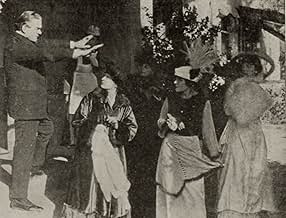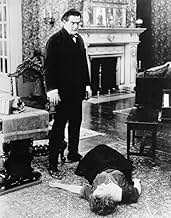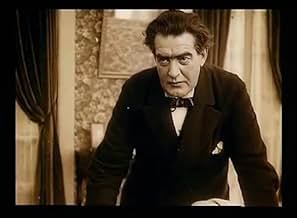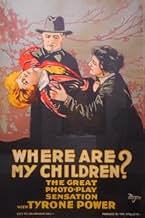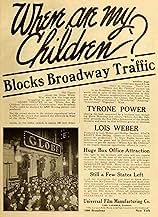Füge eine Handlung in deiner Sprache hinzuA District Attorney's outspoken stand on abortion lands him in trouble with the local community.A District Attorney's outspoken stand on abortion lands him in trouble with the local community.A District Attorney's outspoken stand on abortion lands him in trouble with the local community.
- Auszeichnungen
- 1 wins total
Tyrone Power Sr.
- District Attorney Richard Walton
- (as Mr. Tyrone Power)
Mrs. Tyrone Power
- Mrs. Richard Walton
- (as Helen Riaume)
Alva D. Blake
- Roger - Mrs. Walton's Brother
- (as A.D. Blake)
George Berrell
- Judge
- (Nicht genannt)
Georgia French
- Child
- (Nicht genannt)
Mary MacLaren
- Walton's Maid
- (Nicht genannt)
Andy MacLennan
- Man on Street
- (Nicht genannt)
Anne Power
- Infant
- (Nicht genannt)
Empfohlene Bewertungen
A controversial film in its day for advancing the agenda of social crusader Margaret Sanger, and controversial today for reasons beyond the touchy anti-abortion stance it takes - most disturbingly, its support for eugenics, which was in vogue in many countries in the early part of the century. In a nutshell, the position the film takes is that "better" babies will lead to a better, crime-free society, and this in turn means that the better, elevated classes should be procreating, while the coarse, lower classes should be better educated and given birth control. Contraception would not only reduce the number of babies in slums, but it would also help prevent women from illegally turning to abortions, and committing murder in the process. So ... ugh.
As I type that out, it's hard for me to believe I liked it despite these notions, which aside from the education and birth control bits, are repugnant to me. And yet, I did. To start with, I found it remarkable that a movie made in 1916 dealt with birth control, unwanted pregnancy, and abortion, and that it was made by a woman, film pioneer Lois Weber, when she couldn't even vote. The movie unfortunately comes down on the side of supporting the patriarchy, but I found a feminine voice here, one that includes criticisms of men that I have to believe were apparent even then. And the spirit of the film, with its title cards in the beginning encouraging openness and conversation, as well as its intention - which believe it or not was progressive - strikes a chord with me. The steps along the road to progress are imperfect, just as we today are imperfect. Margaret Sanger's birth control organization would one day evolve into the Planned Parenthood we know today.
In one of my favorite scenes, a doctor is on trial for distributing a book advocating birth control. As he puts it, "I am accused of distributing indecent literature because I advocate birth regulation. The law should help instead of hinder me." He is doing nothing more than educate and exercise his right to free speech, and yet this was illegal in America at the time, per the Comstock laws of 1873, which Sanger herself was prosecuted for a couple of years before. We not only feel the unfairness of his conviction, but via the fantastic intertitle: "A jury of men disagreed with Dr. Homer's views," feel a double unfairness. The word "men" is not emphasized but it might as well have been in bold, all caps, underlined, and in large font, it stands out so much. Men have all the power for an issue that affects women far more.
This sad irony is pointed out further when we see that the guy who impregnates the maid's daughter can just move on with his life, while she will be viewed by society as a disgrace if she carries the baby to term out of wedlock, and as a murderer if she has a secret abortion. He's had his fun and goes whistling away; she's "ruined." While the majority of Americans at the time considered abortion murder and it was illegal, I have to believe they must have seen this unfairness. We also abhor this guy because he's older, and despite getting a slap in the face initially, continues to pursue this innocent girl. Her age is not stated but she's dressed and acts as a teenager, and Rena Rogers, the actress herself, was 16. As he aggressively puts his moves on her, an intertitle tells us "Practice teaches men of this class the bold methods that sweep inexperienced girls off their feet." I see a form of feminism in a woman putting this up on the screen.
Unfortunately, the film has some very heavy baggage, and I don't blame anyone for being offended by it. The education and birth control bits target the poor, who are shown as in desperate marriages with too many kids, leading to the mother's suicide in one case, and domestic abuse and a nasty fight between husband and wife in another. (Though as a side note to the latter, how realistic and sad it is that they both turn on the cop when he comes, instead of the woman getting actual help.) The poor shouldn't be having all these kids to begin with, because eugenically speaking, they are undesirable elements that lead to crime, which is a detestable notion not very far removed from those advanced by Hitler. The spectrum of ideas that at the time seemed to logically follow from Darwin included many that were horrifying, and adopted by those across the political spectrum, including Sanger and Weber.
As for abortion, the film is clearly against it, and while I personally disagree with that, it's harder to fault it for this, given the debate which still rages on in America, and the fact that this is also the opinion of five of nine Supreme Court justices in 2019. It lets us know this in no uncertain terms. Dr. Homer's birth control book contains the passage "Let us stop the slaughter of the unborn and save the lives of unwilling mothers." The wife of the District Attorney (Helen Riaume, who was Tyrone Power Sr.'s real-life wife) has not only stopped herself from having children more than once because she's not ready via abortion (and not told her husband about it), but she also refers her friend and her maid's daughter to the same doctor. The former's procedure goes routinely, but the latter's has a complication which leads to the girl's death. Rather than pointing out that these underground, unregulated abortions inherently had safety issues, and that maybe they should be legalized, the film sees it a different way. The doctor gets sentenced to 15 years of hard labor in prison, and we get the idea that this is a just and proper punishment.
Worse yet, when he blurts out to the D.A. that he should check out his own house, the latter figures out what his wife has been doing. The view is then that she's cheated him - "Where are my children?" his intertitle asks in a dramatic, accusatory way - and the couple are then sentenced to a lonely, childless life in old age, because her abortions have made it impossible for her to have kids even though she now wants them (of course). Ah the poor man, an "officer of the law, who must shield a murderess!" and who all night long "grieved for his lost children." The woman has wronged him, and throws herself at his feet. It's tough to watch, though I think this was just the reality of 1916.
I don't mean to justify or excuse the film, but I found it fascinating and still relevant. It was interesting to compare our progress today to this snapshot of social activism from 103 years ago, and it was thought provoking to me in the way that Weber intended per those first couple title cards, even if my views differ drastically from hers.
As I type that out, it's hard for me to believe I liked it despite these notions, which aside from the education and birth control bits, are repugnant to me. And yet, I did. To start with, I found it remarkable that a movie made in 1916 dealt with birth control, unwanted pregnancy, and abortion, and that it was made by a woman, film pioneer Lois Weber, when she couldn't even vote. The movie unfortunately comes down on the side of supporting the patriarchy, but I found a feminine voice here, one that includes criticisms of men that I have to believe were apparent even then. And the spirit of the film, with its title cards in the beginning encouraging openness and conversation, as well as its intention - which believe it or not was progressive - strikes a chord with me. The steps along the road to progress are imperfect, just as we today are imperfect. Margaret Sanger's birth control organization would one day evolve into the Planned Parenthood we know today.
In one of my favorite scenes, a doctor is on trial for distributing a book advocating birth control. As he puts it, "I am accused of distributing indecent literature because I advocate birth regulation. The law should help instead of hinder me." He is doing nothing more than educate and exercise his right to free speech, and yet this was illegal in America at the time, per the Comstock laws of 1873, which Sanger herself was prosecuted for a couple of years before. We not only feel the unfairness of his conviction, but via the fantastic intertitle: "A jury of men disagreed with Dr. Homer's views," feel a double unfairness. The word "men" is not emphasized but it might as well have been in bold, all caps, underlined, and in large font, it stands out so much. Men have all the power for an issue that affects women far more.
This sad irony is pointed out further when we see that the guy who impregnates the maid's daughter can just move on with his life, while she will be viewed by society as a disgrace if she carries the baby to term out of wedlock, and as a murderer if she has a secret abortion. He's had his fun and goes whistling away; she's "ruined." While the majority of Americans at the time considered abortion murder and it was illegal, I have to believe they must have seen this unfairness. We also abhor this guy because he's older, and despite getting a slap in the face initially, continues to pursue this innocent girl. Her age is not stated but she's dressed and acts as a teenager, and Rena Rogers, the actress herself, was 16. As he aggressively puts his moves on her, an intertitle tells us "Practice teaches men of this class the bold methods that sweep inexperienced girls off their feet." I see a form of feminism in a woman putting this up on the screen.
Unfortunately, the film has some very heavy baggage, and I don't blame anyone for being offended by it. The education and birth control bits target the poor, who are shown as in desperate marriages with too many kids, leading to the mother's suicide in one case, and domestic abuse and a nasty fight between husband and wife in another. (Though as a side note to the latter, how realistic and sad it is that they both turn on the cop when he comes, instead of the woman getting actual help.) The poor shouldn't be having all these kids to begin with, because eugenically speaking, they are undesirable elements that lead to crime, which is a detestable notion not very far removed from those advanced by Hitler. The spectrum of ideas that at the time seemed to logically follow from Darwin included many that were horrifying, and adopted by those across the political spectrum, including Sanger and Weber.
As for abortion, the film is clearly against it, and while I personally disagree with that, it's harder to fault it for this, given the debate which still rages on in America, and the fact that this is also the opinion of five of nine Supreme Court justices in 2019. It lets us know this in no uncertain terms. Dr. Homer's birth control book contains the passage "Let us stop the slaughter of the unborn and save the lives of unwilling mothers." The wife of the District Attorney (Helen Riaume, who was Tyrone Power Sr.'s real-life wife) has not only stopped herself from having children more than once because she's not ready via abortion (and not told her husband about it), but she also refers her friend and her maid's daughter to the same doctor. The former's procedure goes routinely, but the latter's has a complication which leads to the girl's death. Rather than pointing out that these underground, unregulated abortions inherently had safety issues, and that maybe they should be legalized, the film sees it a different way. The doctor gets sentenced to 15 years of hard labor in prison, and we get the idea that this is a just and proper punishment.
Worse yet, when he blurts out to the D.A. that he should check out his own house, the latter figures out what his wife has been doing. The view is then that she's cheated him - "Where are my children?" his intertitle asks in a dramatic, accusatory way - and the couple are then sentenced to a lonely, childless life in old age, because her abortions have made it impossible for her to have kids even though she now wants them (of course). Ah the poor man, an "officer of the law, who must shield a murderess!" and who all night long "grieved for his lost children." The woman has wronged him, and throws herself at his feet. It's tough to watch, though I think this was just the reality of 1916.
I don't mean to justify or excuse the film, but I found it fascinating and still relevant. It was interesting to compare our progress today to this snapshot of social activism from 103 years ago, and it was thought provoking to me in the way that Weber intended per those first couple title cards, even if my views differ drastically from hers.
Quite apart from being one of the few chances to see a Tyrone Power film (father, not son); this Lois Weber film is a powerful anti-abortion piece - albeit one which is clogged with concerns around birth control and what looks to be misguided focus on the process of eugenics (i.e. determining strong genes and background before having children).
DA Richard Walton has always wanted children and cannot understand why his wife (played by the real-life Mrs Power, Helen Riaume) fails to conceive. Of course as we quickly find out, she has sent many unwanted children back to the portal of heaven where they wait to be called, by having numerous abortions and arranging for her friends to do the same, including the lazy social butterfly Mrs Carlo (Marie Walcamp).
There are three plot strands here - one concerning a progressive doctor (C Norman Hammond) who wishes to teach the poor about birth control and who is being prosecuted for obscenity; one concerning a virginal housemaid's daughter (Rena Rogers) who is seduced by Mr Walton's brother-in-law (William J Hope), with tragic consequences; and one about the trips to the abortion clinic of Dr Malfit (Juan de la Cruz) which are commonplace to Mrs Walton and her set.
Intercut with these stories are sights of the children waiting to be called into the womb - the unwanted as well as the wanted. This is perhaps the most artificial part of the film as the gates of heaven open and close to allow children to be called to earth or to return again to the portal of the unwanted. It works but looks rather old fashioned these days.
The ending is very moving, however, as Mr and Mrs Walton, knowing she is now unable to have children, are surrounded by the ghosts of their unborn as they descend into old age.
A preachy film but a powerful one. Amazing to think that items tackled here, over 90 years ago, could not be touched on again until the second half of the twentieth century.
DA Richard Walton has always wanted children and cannot understand why his wife (played by the real-life Mrs Power, Helen Riaume) fails to conceive. Of course as we quickly find out, she has sent many unwanted children back to the portal of heaven where they wait to be called, by having numerous abortions and arranging for her friends to do the same, including the lazy social butterfly Mrs Carlo (Marie Walcamp).
There are three plot strands here - one concerning a progressive doctor (C Norman Hammond) who wishes to teach the poor about birth control and who is being prosecuted for obscenity; one concerning a virginal housemaid's daughter (Rena Rogers) who is seduced by Mr Walton's brother-in-law (William J Hope), with tragic consequences; and one about the trips to the abortion clinic of Dr Malfit (Juan de la Cruz) which are commonplace to Mrs Walton and her set.
Intercut with these stories are sights of the children waiting to be called into the womb - the unwanted as well as the wanted. This is perhaps the most artificial part of the film as the gates of heaven open and close to allow children to be called to earth or to return again to the portal of the unwanted. It works but looks rather old fashioned these days.
The ending is very moving, however, as Mr and Mrs Walton, knowing she is now unable to have children, are surrounded by the ghosts of their unborn as they descend into old age.
A preachy film but a powerful one. Amazing to think that items tackled here, over 90 years ago, could not be touched on again until the second half of the twentieth century.
This film is most certainly not feminist but it was a courageous film to have made in 1910. Censorship already existed very strongly in the US and the idea that it only came in with the Hays Code in the thirties is a complete myth.
The film did have its imitators in the next year or so (a girl dies after an abortion in Enlighten thy Daughter 1917) and the subject would occasionally be raised rather obliquely in later films (The Road to Ruin 1928, 1934 and Ann Vickers 1933) or treated salaciously in exploitation films (Street Corner 1948) but it would not be until the 1960s that it would again become possible to treat such subjects seriously in US films (and even then it is primarily British rather than US films that come to mind). Plans to make a remake of Weber's film in 1936 had to be cancelled. As late as 1956, the revised Hays code insisted that "the subject of abortion shall be discouraged, shall never be more than suggested, and when referred to shall be condemned. It must never be treated lightly, or made the subject of comedy. Abortion shall never be shown explicitly or by inference, and a story must not indicate that an abortion has been performed, the word "abortion" shall not be used."
Weber's consideration of the question is entirely serious and all the aspects she considers, whatever one's opinion about voluntary miscarriage being legal of which there was not even the remotest possibility in 1916, remain entirely valid. Sometimes today the belief that women should have choice in these matters becomes confused with a vague idea that abortion is somehow completely problem-free, which it most certainly is not.
And Weber is entirely to be commended for taking up so strongly the case for birth control (an equally taboo subject)and against the 1873 Comstock Law that prevented discussion of it. This was also the subject of an unofficial sequel to this film (lost) called The Hand that Rocks the Cradle, in which she herself acted (and is the one arrested for promoting birth control). The film was, however, rather overshadowed by the appearance of Margaret Sanger's own film Birth Control even though the latter was effectively banned by the censors.
The film played to packed houses in sophisticated urban centres and won much critical praise because of its evident earnestness and religious iconography (one southern US newspaper described it as "one of the most remarkable preachments yet filmed") but it did also attract adverse criticism but it had to be shown in different (cut) versions in different parts of the country, and was particularly badly butchered (although not banned as is sometimes claimed) in Weber's home-state of Pennsylvania.
There are also some signs of a backlash. Photoplay later claimed that the films had spawned "a filthy host of nasty-minded imitators" and in 1917 when Essanay brought out a filmed called "Where is My Mother?" (evidently adapting the title of Weber's film) in its "Do the Children Count?" series, a particularly prissy reviewer in Moving Picture World praised it precisely because it avoided "distasteful reference to birth control and sex problems".
The film did have its imitators in the next year or so (a girl dies after an abortion in Enlighten thy Daughter 1917) and the subject would occasionally be raised rather obliquely in later films (The Road to Ruin 1928, 1934 and Ann Vickers 1933) or treated salaciously in exploitation films (Street Corner 1948) but it would not be until the 1960s that it would again become possible to treat such subjects seriously in US films (and even then it is primarily British rather than US films that come to mind). Plans to make a remake of Weber's film in 1936 had to be cancelled. As late as 1956, the revised Hays code insisted that "the subject of abortion shall be discouraged, shall never be more than suggested, and when referred to shall be condemned. It must never be treated lightly, or made the subject of comedy. Abortion shall never be shown explicitly or by inference, and a story must not indicate that an abortion has been performed, the word "abortion" shall not be used."
Weber's consideration of the question is entirely serious and all the aspects she considers, whatever one's opinion about voluntary miscarriage being legal of which there was not even the remotest possibility in 1916, remain entirely valid. Sometimes today the belief that women should have choice in these matters becomes confused with a vague idea that abortion is somehow completely problem-free, which it most certainly is not.
And Weber is entirely to be commended for taking up so strongly the case for birth control (an equally taboo subject)and against the 1873 Comstock Law that prevented discussion of it. This was also the subject of an unofficial sequel to this film (lost) called The Hand that Rocks the Cradle, in which she herself acted (and is the one arrested for promoting birth control). The film was, however, rather overshadowed by the appearance of Margaret Sanger's own film Birth Control even though the latter was effectively banned by the censors.
The film played to packed houses in sophisticated urban centres and won much critical praise because of its evident earnestness and religious iconography (one southern US newspaper described it as "one of the most remarkable preachments yet filmed") but it did also attract adverse criticism but it had to be shown in different (cut) versions in different parts of the country, and was particularly badly butchered (although not banned as is sometimes claimed) in Weber's home-state of Pennsylvania.
There are also some signs of a backlash. Photoplay later claimed that the films had spawned "a filthy host of nasty-minded imitators" and in 1917 when Essanay brought out a filmed called "Where is My Mother?" (evidently adapting the title of Weber's film) in its "Do the Children Count?" series, a particularly prissy reviewer in Moving Picture World praised it precisely because it avoided "distasteful reference to birth control and sex problems".
This is a heavy-handed, didactic melodrama that nevertheless doesn't descend to mere propaganda. Although a eugenics perspective is introduced in the beginning it is never explored even though it could have presented an excellent opportunity for conflict in Tyrone Power's character and situation. Most of the rest of the film is trite in its portrayal of a pristine young woman whose character and life are destroyed by an evil, sneering, all-but-drooling villain. Missing is an exploration of how such a young woman could succumb to this man. Instead, much time is spent in melodramatic mugging and obvious titles. Too bad, because the final scenes show brilliant early cinematic narration, making all the film's points more dramatically than the entire rest of the film.
I find it interesting that Mrs. Walton is credited as Helen Riaume (with no IMDb link). This appears to have been the same Helen Riaume who is credited elsewhere as "Mrs. Tyrone Power," and was Tyrone Power Sr.'s wife until the same year this was released. The content of this film is unusual enough, and having a married couple playing the leads and not credited as such adds to the interest.
In particular, the content was of a controversial nature in 1916, and is even more so today, with the sides reversed. The topic of abortion (called simply "birth control" in this movie) was not one that was raised often in films anyway, and moral guardians would have hesitated to let a movie through that favored the practice. The climate of Hollywood being what it is today, there might be no legal impediment to making a similarly anti-abortion film, but it would certainly be frowned upon, and perhaps de facto blacklisted.
In particular, the content was of a controversial nature in 1916, and is even more so today, with the sides reversed. The topic of abortion (called simply "birth control" in this movie) was not one that was raised often in films anyway, and moral guardians would have hesitated to let a movie through that favored the practice. The climate of Hollywood being what it is today, there might be no legal impediment to making a similarly anti-abortion film, but it would certainly be frowned upon, and perhaps de facto blacklisted.
Wusstest du schon
- WissenswertesThe two children of Tyrone Power Sr. and his co-star and real-life wife Helen Reaume (aka, Mrs. Tyrone Power), appear in this film: their newborn daughter Anne Power and their two-year-old son Tyrone Power, who became a matinee idol from the 1930s to the 1950s. He appears in the last minute and a half of the movie as a "ghost child".
- Zitate
Opening Title Card I: The question of birth control is now being generally discussed. All intelligent people know that birth control is a subject of serious public interest. Newspapers, magazines and books have treated different phases of this question. Can a subject thus dealt with on the printed page be denied careful dramatization on the motion picture screen? The Universal Film Mfg. Company believes not.
- Alternative VersionenIn 2000, the Library of Congress Motion Picture Conservation Center copyrighted a preservation print reconstructed from several incomplete prints. Funded by the Women's Film Preservation Fund of New York Women in Film and Television, it was coordinated by Scott Simmon, has a piano score composed and performed by Martin Marks, and runs 62 minutes.
- VerbindungenEdited into Governing Body (2023)
Top-Auswahl
Melde dich zum Bewerten an und greife auf die Watchlist für personalisierte Empfehlungen zu.
Details
- Erscheinungsdatum
- Herkunftsland
- Sprachen
- Auch bekannt als
- The Illborn
- Drehorte
- Produktionsfirmen
- Weitere beteiligte Unternehmen bei IMDbPro anzeigen
- Laufzeit1 Stunde 2 Minuten
- Sound-Mix
- Seitenverhältnis
- 1.33 : 1
Zu dieser Seite beitragen
Bearbeitung vorschlagen oder fehlenden Inhalt hinzufügen

Oberste Lücke
By what name was Where Are My Children? (1916) officially released in Canada in English?
Antwort
